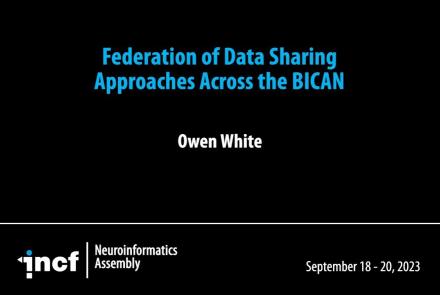Lesson type
Difficulty level
This lecture covers the ethical implications of the use of brain-computer interfaces, brain-machine interfaces, and deep brain stimulation to enhance brain functions and was part of the Neuro Day Workshop held by the NeuroSchool of Aix Marseille University.
Difficulty level: Beginner
Duration: 1:02:00
Speaker: : Jens Clausen
Course:
This module covers many types of invasive neurotechnology devices/interfaces for the central and peripheral nervous systems. Invasive neurotech devices are crucial, as they often provide the greatest accuracy and long-term use applicability.
Difficulty level: Beginner
Duration: 9:40
Speaker: : Colin Fausnaught
Course:
This lesson gives an introduction to the Mathematics chapter of Datalabcc's Foundations in Data Science series.
Difficulty level: Beginner
Duration: 2:53
Speaker: : Barton Poulson
Course:
This lesson serves a primer on elementary algebra.
Difficulty level: Beginner
Duration: 3:03
Speaker: : Barton Poulson
Course:
This lesson provides a primer on linear algebra, aiming to demonstrate how such operations are fundamental to many data science.
Difficulty level: Beginner
Duration: 5:38
Speaker: : Barton Poulson
Course:
In this lesson, users will learn about linear equation systems, as well as follow along some practical use cases.
Difficulty level: Beginner
Duration: 5:24
Speaker: : Barton Poulson
Course:
This talk gives a primer on calculus, emphasizing its role in data science.
Difficulty level: Beginner
Duration: 4:17
Speaker: : Barton Poulson
Course:
This lesson clarifies how calculus relates to optimization in a data science context.
Difficulty level: Beginner
Duration: 8:43
Speaker: : Barton Poulson
Course:
This lesson covers Big O notation, a mathematical notation that describes the limiting behavior of a function as it tends towards a certain value or infinity, proving useful for data scientists who want to evaluate their algorithms' efficiency.
Difficulty level: Beginner
Duration: 5:19
Speaker: : Barton Poulson
Course:
This lesson serves as a primer on the fundamental concepts underlying probability.
Difficulty level: Beginner
Duration: 7:33
Speaker: : Barton Poulson
Serving as good refresher, this lesson explains the maths and logic concepts that are important for programmers to understand, including sets, propositional logic, conditional statements, and more.
This compilation is courtesy of freeCodeCamp.
Difficulty level: Beginner
Duration: 1:00:07
Speaker: : Shawn Grooms
This lesson provides a useful refresher which will facilitate the use of Matlab, Octave, and various matrix-manipulation and machine-learning software.
This lesson was created by RootMath.
Difficulty level: Beginner
Duration: 1:21:30
Speaker: :
This talk discusses what are usually considered successful outcomes of scientific research consortia, and how those outcomes can be translated into lasting impacts.
Difficulty level: Beginner
Duration: 18:24
Speaker: : Anita Bandrowski
In this lesson, you will learn about the BRAIN Initiative Cell Atlas Network (BICAN) and how this project adopts a federated approach to data sharing.
Difficulty level: Beginner
Duration: 11:23
Speaker: : Owen White
This lecture covers the emergence of cognitive science after the Second World War as an interdisciplinary field for studying the mind, with influences from anthropology, cybernetics, and artificial intelligence.
Difficulty level: Beginner
Duration: 51:07
Speaker: : Paul F.M.J. Verschure
This lesson provides an introduction to neurons, synaptic transmission, and ion channels.
Difficulty level: Beginner
Duration: 46:07
Speaker: : Christoph Schwarzer
This lecture consists of the second half of the introduction to signal transduction, here focusing on cell receptors and signalling cascades.
Difficulty level: Beginner
Duration: 41:38
Speaker: : Christoph Schwarzer
This lecture gives an introduction to the types of glial cells, homeostasis (influence of cerebral blood flow and influence on neurons), insulation and protection of axons (myelin sheath; nodes of Ranvier), microglia and reactions of the CNS to injury.
Difficulty level: Beginner
Duration: 40:32
Speaker: : Christine Bandtlow
Followers of this lesson wilul learn about the origin and differentiation of myelinating cell types, molecular mechanisms defining onset and progression of myelination, as well as demyelination and remyelination after injury.
Difficulty level: Beginner
Duration: 38:52
Speaker: : Christine Bandtlow
This lecture covers integrating information within a network, modulating and controlling networks, functions and dysfunctions of hippocampal networks, and the integrative network controlling sleep and arousal.
Difficulty level: Beginner
Duration: 47:05
Speaker: : Christoph Schwarzer
Topics
- Artificial Intelligence (6)
- Philosophy of Science (5)
- Provenance (2)
- protein-protein interactions (1)
- Extracellular signaling (1)
- Animal models (6)
- Assembly 2021 (29)
- Brain-hardware interfaces (13)
- Clinical neuroscience (17)
- International Brain Initiative (2)
- Repositories and science gateways (11)
- Resources (6)
- General neuroscience
(45)
- Neuroscience (9)
- Cognitive Science (7)
- Cell signaling (3)
- Brain networks (4)
- Glia (1)
- Electrophysiology (16)
- Learning and memory (3)
- Neuroanatomy (17)
- (-) Neurobiology (7)
- Neurodegeneration (1)
- (-) Neuroimmunology (1)
- Neural networks (4)
- Neurophysiology (22)
- Neuropharmacology (2)
- Synaptic plasticity (2)
- Visual system (12)
- Phenome (1)
- General neuroinformatics
(15)
- Computational neuroscience (195)
- Statistics (2)
- Computer Science (15)
- Genomics (26)
- Data science
(24)
- Open science (56)
- Project management (7)
- Education (3)
- Publishing (4)
- Neuroethics (37)




















